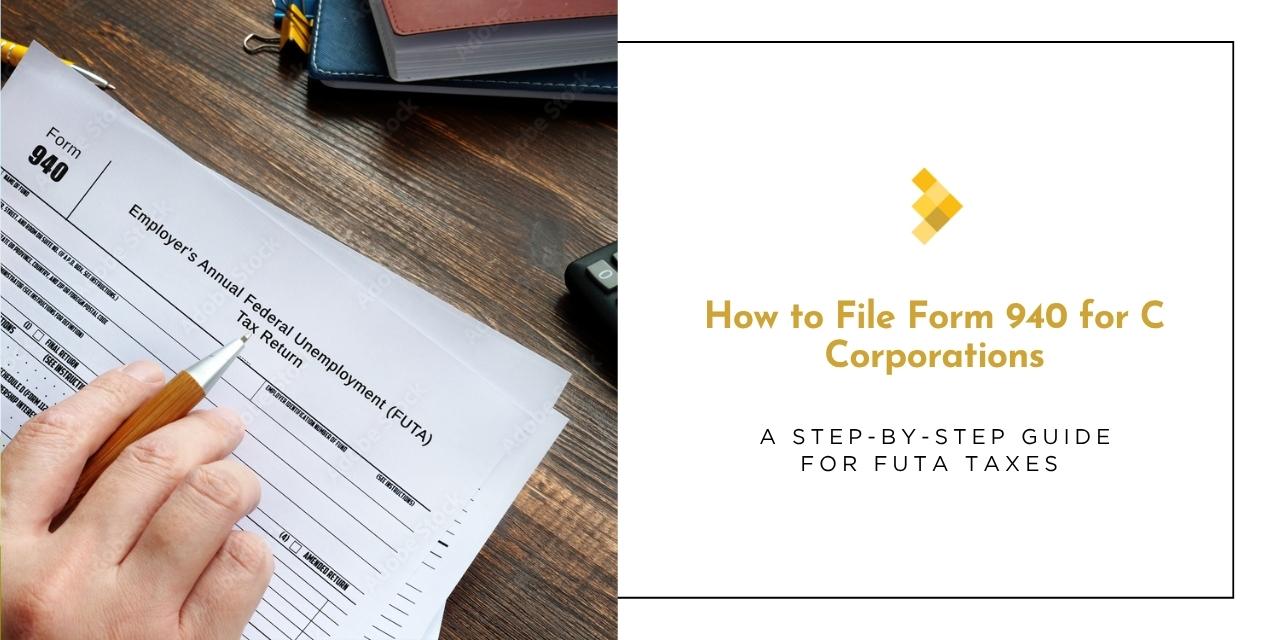Did you know failing to file Form 940 on time can cost your corporation thousands in penalties, regardless of profits? As a business owner, the last thing you need is a costly oversight in your FUTA tax filing.
In this guide, we’ll walk you through everything you need to know about Form 940, from who needs to file, to how you can save on taxes, avoid penalties, and stay fully compliant with IRS requirements.
What is Form 940?
Form 940 is the Employer’s Annual Federal Unemployment Tax Act (FUTA) Tax Return that U.S. employers, including C corporations, must file each year. If your business pays $1,500 or more in wages during any calendar quarter or employs at least one worker for 20 or more weeks in a year, filing is mandatory. If your business doesn’t meet these thresholds, you can still file Form 940 voluntarily or claim a refund.
The FUTA tax funds federal unemployment compensation programs, providing financial assistance to workers who lose their jobs. Form 940 helps the IRS track how much a business owes in unemployment taxes and ensures that corporations contribute to these programs as required.
Who Needs to File Form 940?
Form 940 must be filed by C corporations that meet any of the following conditions:
• Paid $1,500 or more in wages in any calendar quarter.
• Employed at least one worker for 20 weeks or more during the year.
Even if your corporation doesn’t meet these thresholds, you may still need to file Form 940 to claim a refund for overpaid FUTA taxes or stay compliant with Form 940 instructions provided by the IRS. IRS Form 940 and seasonal workers should also be considered, as seasonal employees may impact how you calculate FUTA wages and filing obligations.
FUTA Tax Rates and Credit Reduction
The standard FUTA tax rate is 6.0% on the first $7,000 of wages paid to each employee, resulting in a maximum tax of $420 per employee for the year.
However, businesses can reduce their FUTA tax rate if they pay state unemployment taxes:
This system allows businesses to lower their FUTA tax liability by staying compliant with state unemployment tax requirements. Filing Form 940 correctly ensures all credits are applied.
How Does Form 940 Differ from Form 941?
Form 940 and Form 941 are both essential for C corporations, but they serve different purposes in reporting employment taxes.
• Form 940: This form is specifically used to report FUTA tax (Federal Unemployment Tax Act), which is a tax paid entirely by employers to fund unemployment benefits for workers who lose their jobs. Form 940 is filed annually.
• Form 941: In contrast, Form 941 is used to report payroll taxes shared between the employer and employee, including Social Security, Medicare, and federal income tax withholding. Form 941 is filed quarterly, as these taxes are regularly collected from employees’ paychecks and must be paid to the IRS throughout the year.
To sum up, Form 940 handles unemployment tax for employers only, while Form 941 tracks shared payroll taxes for both employees and employers.
Key Deadlines and Extensions for Form 940
• Due Date: Form 940 must be filed by January 31 of the following year. If the due date falls on a weekend or holiday, the deadline is extended to the next business day. Additionally, FUTA tax deposits are due quarterly if they exceed $500.
• Extension: Corporations can request an automatic 6-month extension using Form 8868.
• Important Note: The extension applies to filing only. FUTA tax payments are still due by January 31.
Urgent Reminder: For corporations with a fiscal year ending June 30, the filing deadline for Form 940 is October 15, 2025. Prepare early to avoid penalties!
Step-by-Step Guide to Filing Form 940
Filing Form 940 requires several steps to ensure your FUTA tax is correctly reported and paid. Here’s a detailed guide on how to file:
1. Gather Payroll Data
Start by collecting all necessary payroll records for the year, including:
• Employee wages: The total wages paid to each employee.
• State unemployment taxes: Any state taxes paid to comply with state unemployment requirements.
• Number of employees: The total number of employees for whom you paid wages.
These records are essential for accurate reporting on Form 940.
2. Calculate FUTA Liability
Next, calculate your corporation’s tax liability:
• Apply the standard 6.0% FUTA tax rate to each employee’s wages up to $7,000.
• If an employee’s wages exceed $7,000, no additional FUTA tax is due on their income for the rest of the year.
If your corporation is eligible for a state unemployment tax credit, subtract it from your total liability to lower the FUTA tax due. This credit can be up to 5.4% if your corporation paid state unemployment taxes on time.
3. Complete Form 940
Now, fill out the form itself by providing the necessary details:
• Part 1: Enter your basic business information, including the corporation’s name, EIN, and tax year. This section is the same for all C corporations.
• Part 2: Report the total taxable wages and the FUTA liability for each employee (as calculated in Step 2).
• Part 3: Apply the state unemployment tax credit (if applicable) to reduce your federal FUTA liability.
Ensure all calculations are accurate to avoid mistakes that could lead to penalties.
4. File Form 940
Once completed, file Form 940 with the IRS:
• E-filing: The fastest and most secure option. The IRS recommends e-filing through their approved platforms.
• Paper filing: If you must file by mail, send the completed form to the IRS address assigned to your state.
Filing online ensures quicker processing and acknowledgment from the IRS.
5. Pay Your FUTA Tax
Make the required FUTA tax payment:
• Due by January 31: FUTA tax payments are due annually by January 31 of the following year.
• If your liability exceeds $500, you must make quarterly payments using EFTPS (Electronic Federal Tax Payment System) throughout the year.
Remember, failing to make timely payments can lead to penalties and interest.
Penalties for Late Filing and Payment
The IRS imposes various penalties for late filing and late payment of FUTA taxes. The penalties vary depending on how late the form is filed and the payment is made:
• Failure-to-File Penalty:
• 2% of the unpaid tax if the return is 1 to 5 days late.
• 5% if the return is 6 to 15 days late.
• 10% if the return is 16 or more days late.
• 15% if the return is 10 or more days late after the IRS issues its first notice.
• The penalty can go up to 25% of the total tax due if the return remains late.
• Failure-to-Pay Penalty:
• 0.5% of the unpaid tax per month until it is paid in full, also capped at 25% of the unpaid tax.
• Interest:
• Interest is charged on any unpaid tax from the due date until it is fully paid. The IRS calculates interest on a daily basis, so even small delays can result in significant extra charges.
• Accuracy-Related Penalties:
• A 20% penalty applies if the underpayment is due to negligence or substantial underreporting of income.
Timely filing and payment are essential to avoid these penalties and ensure your corporation stays compliant with the IRS. For those looking for more detailed information on penalties, credits, and FUTA tax calculations, the IRS Form 940 instructions provide comprehensive guidance.
IRS Updates for Form 940
• Late Filing Penalties: The IRS now imposes a minimum penalty of $510 if Form 940 is filed more than 60 days late. This is the smaller of the tax due or $510. Make sure to file on time to avoid this penalty.
• CAMT Relief: Under the Corporate Alternative Minimum Tax (CAMT) rules, certain corporations may qualify for relief from penalties related to underpayments. This provides more flexibility to adjust to new tax requirements.
• Online Filing Tools: The IRS has enhanced its digital platforms, offering e-filing, account transcripts, and secure e-payments for Form 940 filers. This makes it easier for corporations to comply and track their tax filings.
Common Mistakes to Avoid When Filing Form 940
• Incorrect FUTA tax calculations
• Missing the 5.4% state unemployment tax credit
• Filing and making payment after the deadline
• Inaccurate reporting of taxable wages
• Not keeping adequate records
• Using outdated form versions
By avoiding these mistakes, you can ensure a smoother Form 940 filing process and reduce the risk of penalties.
Conclusion
Filing Form 940 is essential for C corporations to stay compliant with FUTA tax laws and avoid penalties. By following the right steps, meeting deadlines, and applying the correct credits, you can reduce your tax liability and keep your business running smoothly.
Book your free consultation today to ensure your Form 940 is filed correctly and on time, with expert assistance every step of the way.




